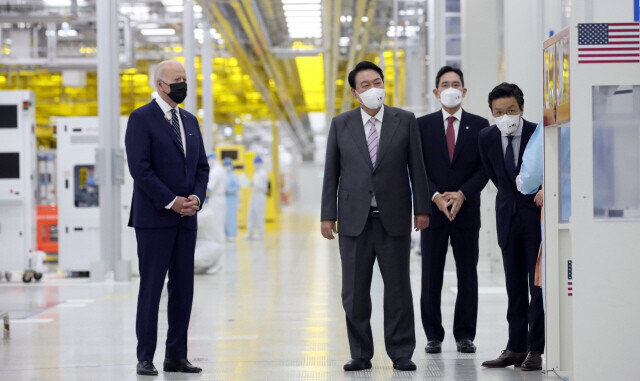hankyoreh
Links to other country sites 다른 나라 사이트 링크
[Editorial] US-China chip war necessitates Korean strategy, not picking sides

The White House has said that it will join forces with its allies to face China after it placed sanctions on Micron Technology, a US semiconductor company.
The fire of the semiconductor war between the US and China has spread to South Korea, with calls in US political circles for South Korean companies to not fill the void left by Micron’s declining sales in China.
On Wednesday (local time), John Kirby, the spokesperson for the White House’s National Security Council, stated, “We’re going to continue to work closely with our partners and our allies, certainly inside the G7 to deal with distortions of the memory chip market that are caused by the PRC’s actions,” referring to China.
Recently, there have been calls in the US Congress urging retaliation against China’s actions. There has been pressure on South Korea, a major global semiconductor producer that does a lot of business with China, to “stand with the US.”
On Tuesday, China hawk Mike Gallagher, who chairs of US House of Representatives select committee on China, publicly demanded that the US Commerce Department “ensure no US-export licenses granted to foreign semiconductor memory firms operating in the PRC are used to backfill Micron,” and that “our South Korean allies, who have experienced exactly this kind of CCP [Chinese Communist Party] economic coercion firsthand in recent years, should likewise act to prevent backfilling.”
There are also concerns that the hardline rhetoric from Washington could affect the extension of Samsung and SK Hynix’s waiver on the import of mass-market semiconductor equipment in China which is due to end in October.
If South Korea complies with US demands and refuses to increase sales to China, China could retaliate against South Korean semiconductor companies.
Many doubt that the South Korean government appreciates the gravity of the situation and the urgency of its response.
The government recently submitted a request to the US to ease some restrictions on Korean semiconductor companies expanding their factories in China. It’s unclear if the request will be granted, but if it is, Korean semiconductor companies will continue to be less competitive in China.
The US has been ramping up the intensity of its chip war in an effort to catch up with China and bolster domestic advanced manufacturing. China is also focusing on a policy of semiconductor self-sufficiency to reduce its dependence on the US and its allies.
It is imperative for the South Korean government and companies to coordinate and respond carefully. We need to buy time and reduce whatever damage we may receive while avoiding the pressure of having to choose between either the US or China.
The government needs to avoid the illusion that claiming we have an alliance based on values with the US means that the US will take care of our national interests.
We need to develop and elaborate an economic and security strategy that comprehensively considers the future of our national industry and our relationship with China while also cooperating with the US.
Please direct questions or comments to [english@hani.co.kr]

Editorial・opinion
![[Column] Tariffs on China: Trump was dumb, Biden dumber [Column] Tariffs on China: Trump was dumb, Biden dumber](https://flexible.img.hani.co.kr/flexible/normal/500/300/imgdb/original/2024/0520/191716191153918.jpg) [Column] Tariffs on China: Trump was dumb, Biden dumber
[Column] Tariffs on China: Trump was dumb, Biden dumber![[Column] What if Seoul took reunification by force off the table? [Column] What if Seoul took reunification by force off the table?](https://flexible.img.hani.co.kr/flexible/normal/500/300/imgdb/original/2024/0520/3017161928630494.jpg) [Column] What if Seoul took reunification by force off the table?
[Column] What if Seoul took reunification by force off the table?- [Editorial] Intensifying US-China rivalry means Seoul must address uncertainty with Beijing sooner than later
- [Column] When ‘fairness’ means hate and violence
- [Editorial] Yoon must stop abusing authority to shield himself from investigation
- [Column] US troop withdrawal from Korea could be the Acheson Line all over
- [Column] How to win back readers who’ve turned to YouTube for news
- [Column] Welcome to the president’s pity party
- [Editorial] Korea must respond firmly to Japan’s attempt to usurp Line
- [Editorial] Transfers of prosecutors investigating Korea’s first lady send chilling message
Most viewed articles
- 1Xi, Putin ‘oppose acts of military intimidation’ against N. Korea by US in joint statement
- 2Kim Jong-un wanted to meet with residents of shelled Yeonpyeong Island in South, Moon recalls in mem
- 3For new generation of Chinese artists, discontent is disobedience
- 4Berlin mayor hints at tearing down ‘comfort women’ memorial in city
- 5[Column] What if Seoul took reunification by force off the table?
- 6To weigh costs and benefits, Korea must stop treating US troop presence as a sacred cow
- 7[Column] Tariffs on China: Trump was dumb, Biden dumber
- 8China, Russia put foot down on US moves in Asia, ratchet up solidarity with N. Korea
- 9Putin’s trip to China comes amid 63% increase in bilateral trade under US-led sanctions
- 10[Exclusive] Unearthed memo suggests Gwangju Uprising missing may have been cremated